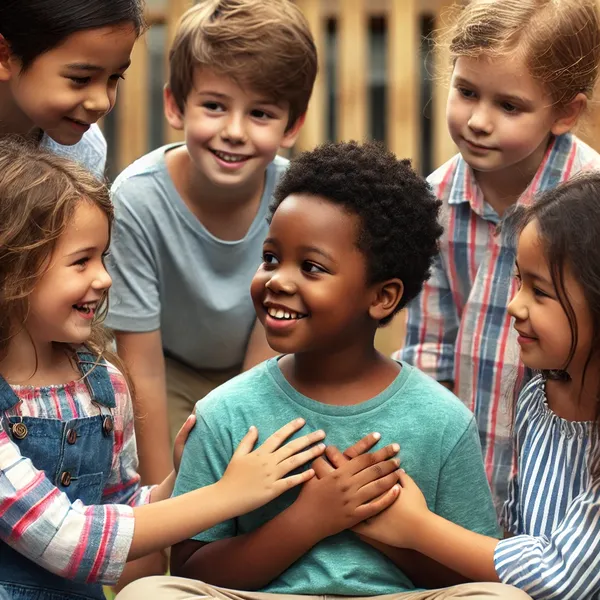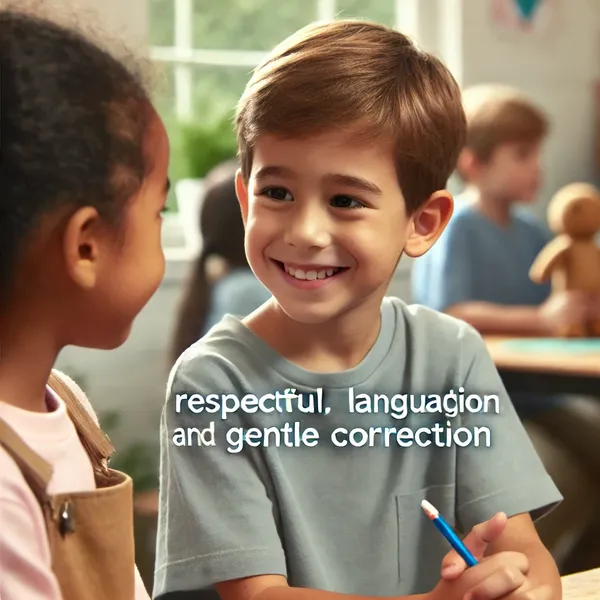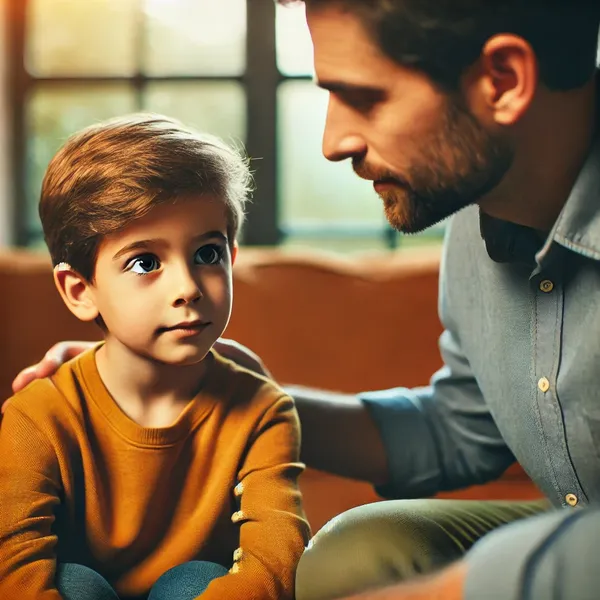How to teach children respect? One of the most fundamental values that we can instill in our kids is Respect. It informs their relationships, impacts how they communicate and helps them mature as kind and empathetic people.
Respect doesn’t grow overnight — it takes time and support.
In the next section we will examine steps to teach kids respect as your line of defense and break each step down into usable tips, things you can start doing right now.
How to Teach Children Respect
Below are some ways to teach children to respect:
1. Start with Self-Respect

The respect you must teach starts with teaching children to first and foremost, have self-respect. This has to do with Respecting Thyself; they will use what you give them which is, “as good as it gets”. The more children are valued, the more they learn to value those around them.
- Mentor Self-Compassion: Let kids know that they are nicely speaking to themselves, too. Just be careful not to put yourself down in front of them, and instead show some ways on how you give yourself a pep talk.
- Boundaries: Instill in your children that self-respect is setting personal boundaries with people. Advising them that they can say no when it bothers them.
Reward Their Effort, Not Just The Results: Praise the work they put into tasks and not just if it is successfully completed. It teaches them that self-love has nothing to do with being perfect, but just doing the best you can.
2. Model Respectful Behavior

Children will copy your behavior, so lead by example. And unfortunately, you are who they model their behavior after.
- Be Polite: Say please, thank you, and excuse me as often as possible. It may seem obvious and overly simplistic, but these words show someone that you give a damn about them.
- Pay Attention: When your child is talking to you, listen. This signals to the child that their ideas count, so they will learn to listen as well.
- Respect Their Choices: Instead of deciding everything for your child, encourage them to make age-appropriate choices. When they are allowed to choose, from what clothes they wear or which hobby pick up later on, that respects them and teaches respect as well for others’ choices.
3. Teach Empathy

At the heart of respect, is empathy. Teaching children to care for the feelings of others helps open up their world beyond themselves.
- Talk about Feelings Often: It is important to check in with children and ask them, how are feeling or what are those emotions that they feel. That is a part of creating emotional intelligence, something that we need in order to be more empathetic.
- Tell stories and give examples: Get books or watch past shows that focus on different emotions. Stop and ask, “What do you think he feels like now? It works all their empathy muscles.
Practice Empathy — Have them get into the other person’s shoes and ask questions like, “How would you feel if someone did that to you?” This makes kids look at things from other people’s perspectives.
4. Reinforce Respectful Language

Respect matters and one way that respect is demonstrated is through the language we use. Show how words and what is said, can hurt others.
Gently Spank it: Tell him that the words are a force for good and bad. Use expressions like these” I know that “or” I appreciate the effort “.
Address Disrespectful Language: Do not ignore their use of disrespectful language Kindly correct them and then tell them why it is not respectful.
Allow Children to Apologize: The reality is that people make mistakes and when we apologize, it shows respect for the person who was wronged.
5. Encourage Listening Skills

One of the foundational skills for demonstrating respect is listening. Learning to listen gives kids the framework for respecting what other people have access to because all learning has 2 parts.
- Active Listening: Make sure they maintain eye contact, nod and question. Taking these steps means that they are watching.
- Educate Turn-Taking: Model patients in conversations)const Teach By Example It helps them learn that conversations are a two-way street.
Respond When they do listen, have them paraphrase what was said; this helps broaden their understanding and respect for opinions.
6. Show Respect for Diversity
This world is huge, and It’s filled with so many different types of people/Cultures/Worlds. Valuing and respecting diversity helps children to accept people from all different walks of life.
- Expose to different cultures: Read books or show them documentaries of other cultures. In doing so, it allows them to see outside of their bubble and understand that everyone brings something different & unique.
- Celebrate Differences: Help children recognize what makes each of us special and unique. Every person has his/her strengths and talents, that make the world an interesting place.
- Question Paramount Myths: If you come across one, debunk it with a conversation about why the myth is erroneous. Kids must learn to appreciate people for who they are and not make assumptions about them.
7. Use Positive Discipline
Respect and discipline are inextricably linked. Discipline is a method of communication and should not be used as punishment.
Define Respectful Behavior They Are More Likely To Follow The Rules If They Know What It Is.
This is why you should never devolve to the level of telling your kids about rules “because I told you so”. After all, it does virtually nothing. Instead of Why be frustrated, tell us the purpose behind some behaviors.
Consistent: This teaches children that respect is not just important in some situations but all.
8. Acknowledge Good Behavior
Reward children when they are respectful and remind them that you care. That rewards system leads to more of that behavior.
- Praise: Validate specific behavior. Instead of, “Good job,” try, “I saw how you shared with your friend. That was very respectful.”
- Small rewards: it can be effective but used in moderation. The idea is that respect should be a default nature, not something they do to get rewarded.
- Teach the Family Values of Respect: Incorporate respect as a family value that everyone in the house celebrates.
RESPECT WALL: Create a wall where family members would post the acts of respect they have seen each other do for one another.
9. Encourage Open Communication
Respect Breeds Open and Honest Discourse Kids who feel heard and can speak openly are also more likely to be respectful of other people’s opinions.
- Check-in Often: Sit with your child and find out how their day was. And encourage them to share without any inhibition.
- Make it a Safe Space: Let your kids know that they can be truly honest. When children feel safe, they are more likely to honor the feelings and thoughts of others.
- Stay Calm in the Face of Disagreement: Make room for disagreements to happen peaceably. We must teach them to say, “Well I think otherwise” instead of making a face.
10. Teach Responsibility
Responsibility is about being considerate of other people’s time, effort and feelings. Assign children small jobs so they can mature and learn about respect through application.
- Give Kids Chores = Respect: Children learn to respect shared spaces and items when they help take care of what is within.
- Teach Responsibility: Show them that they need to own up if they screw something up. It demonstrates that respect involves taking responsibility for our behavior.
- Respect People Time: Ask them to be on time and ready. This is a respectful way of acknowledging others with their time and effort.
11. Example in Conflict Resolution
No matter where your child goes — even at home, to school and so on, they are always bound to have disagreements with somebody. Model Conflict Resolution: Show them how to argue WELL
- Keep Your Cool During Arguments: Demonstrating how to keep your cool, while in the heat of an argument. It also shows them that just because they are upset, it does not mean respect goes out the window.
- Teach your child to communicate their feelings with “I” statements instead of blaming, e.branch: I feel sad when….”
- Seek Solutions, Not Fault: Help them to direct their attention to solutions rather than who is responsible. It shows they respect others’ feelings and it encourages a team orientation.
12. Foster Gratitude
Respect and gratitude go hand in hand. Children who have gratitude also show respect to others.
- Practice Gratitude: Every day, ask for one thing they are thankful to have in life. It keeps them in a positive mindset and allows for respect to develop.
- Send Thank-You Notes: Give your child a stationery to write thank-you notes as appreciation in return for receiving gifts or sweet gestures. Respect is also about realising when someone has been kind.
- Practice Saying Thank You To People: Encourage your children to express gratitude towards others with words like, “Thank you for being my friend” or “I am grateful for the things that you do.” It contributes to a more profound and unique relationship with respect.
13. Have patience and forgive
Respect takes time to learn, and is staying with folks even after they fail you. Teach children everyone makes mistakes, and respect entails the spirit of reconciliation.
- Use Reminders to Breathe: When they start getting upset, let them know that it is important for them to stop and breathe first before reacting. This helps them to be more mature.
- Addition: Help Them Learn to Release=Forcing people is not healthy hatred festers. Let them see it done — forgiving and forgetting, so they know respect is a grudge-free way forward.
- Demonstrate Second Chances: Give them grace to try again when they blow it This shows respect for their development.
14. Make Sure They Realize The Consequences
Children need to sometimes learn that actions come with consequences and respect is essential. Explain the ripple effect of actions and how vital it is to do unto others as they would have you done until them.
- Natural Consequences: If they refuse to share take away the toy and tell them if they are not going to play nicely their friends will maybe not want to play with you. Respect creates better rapport.
- Cite Relatable Examples: Draw from the experiences of their lives, such as how they feel when someone does not listen to them, for respect is paramount.
Foster Problem-Solving, Not Blame — Instead of punishing them simply ask “What can you do differently next time?” next time to show respect?” That way they have something to make mistakes with.
15. Emphasize Respect for Nature
Respect goes beyond people. Teach Respect for Nature: Teaching respect to small children about nature tells them that we should treat our environment with attention because this is also a type of love towards it.
- Be Outdoors: Nature walk, park visit with kids We need to encourage our children […] to see the beauty of nature and why how worthy is it of protection.
- Model environmental stewardship: teach them to recycle, conserve water and not litter. Teach them that taking care of Earth is everybody´s shit.
Discuss the way animals are living things, and they have to be treated kindly. This creates a higher sense of reverence for life.
In Summary
How to teach children respect? Raising children to understand what it feels like when they are not respected is a journey. They need consistency, patience and real-life examples from you.
Through self-respect, empathy, listening abilities and responsibility upon which we stand. Our children learn well to revere others when they have a true understanding of respect. By teaching them every little lesson, you are paving their future with reflection and compassion.
Do it every day and respect will become second nature. Keep in mind, even as you are modelling respect with your child, respectful behaviour should be something that they will also observe by watching how you deal with and treat others on an everyday basis.


